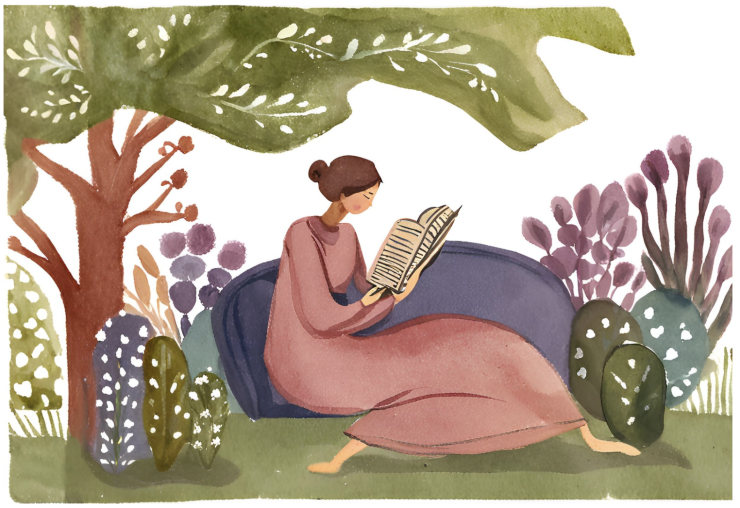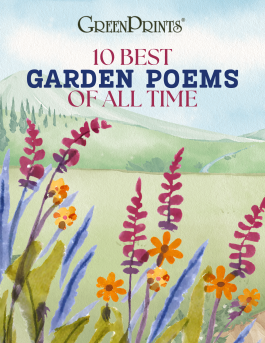
Gardens are a potent symbol of the human struggle to find meaning and purpose. Like a seed struggling to take root and thrive, we all strive to realize our full potential in the face of life’s challenges. Poets like Henry David Thoreau and Robert Louis Stevenson wonderfully capture this existential aspect of the gardening experience in their garden poems, which is really the universal human experience.
One of my favorite garden poems is Henry David Thoreau’s “Sic Vita“. In this short yet impactful work, Thoreau employs an extended metaphor, likening human life to a bunch of violets and other plants that have been plucked from their natural environment and placed in a vase. The poem reflects on the fragility and transience of life, as well as the sense of displacement that comes from being removed from one’s roots. Thoreau describes the violets as “a parcel of vain strivings tied / By a chance bond together,” suggesting that life is a collection of seemingly random and futile endeavors. The flowers are “dangling” and held together by loose, wide links, implying a sense of precariousness and vulnerability.
The metaphorical garden is also the setting of Andrew Marvell’s “The Mower Against Gardens.” Marvell delivers a scathing critique of the artificial, overly manicured gardens of his time. He argues that by imposing their will upon nature, gardeners have corrupted its purity and simplicity. Marvell personifies the gardener as “luxurious man,” who removes plants from their natural habitat and constrains them within the “gardens square.” The poet lists various ways in which the gardener has manipulated plants, such as altering their colors, scents, and even grafting them, which he sees as a form of oppression. Marvell contrasts these artificial gardens with the untouched beauty of the “sweet fields,” where nature reigns supreme. Ultimately, he asserts that the true gods dwell in the natural world, not in the constructs of man.
Gardens are not only a metaphor for life but a rich source of life lessons as well. This idea is charmingly illustrated in Robert Louis Stevenson’s “The Gardener,” which presents a charming, lighthearted view of a child’s perception of the serious, hardworking gardener. The poem, narrated by a young boy, describes the gardener as a quiet, stern figure who goes about his daily tasks with a sense of mystery and solitude. Despite the gardener’s serious demeanor, the boy is fascinated by his work, watching him dig the colorful flowers and tend to the garden. In the latter half of the poem, the boy gently admonishes the gardener for failing to recognize the fleeting nature of summer and suggests that he should take advantage of the pleasant days while he can. The final stanza reveals the boy’s true desire: for the gardener to set aside his tasks and join him in play, highlighting the contrast between the child’s carefree, imaginative world and the gardener’s adult responsibilities.
Similar themes can be found in Robert Frost’s “A Girl’s Garden,” which tells the simple yet poignant tale of a young girl’s first experience planting and tending to her very own garden plot. With the loving support and gentle encouragement of her family, she nurtures her little garden square with youthful enthusiasm and dedication. In the process, she learns valuable lessons about responsibility, patience, and the rewards of hard work that will serve her well throughout life. Frost’s poem is a touching tribute to the wonder of a child’s earliest encounters with the miraculous workings of nature.
Even a garden which has fallen into neglect and disrepair can be a powerful source of poetic inspiration, as evidenced by Elizabeth Barrett Browning’s melancholic masterpiece “The Deserted Garden.” Browning reminisces about a once-beautiful garden that has fallen into neglect. As a child, the speaker found joy and solace in this abandoned space, discovering a hidden sanctuary beneath overgrown rose-trees. Browning contrasts the garden’s past glory with its current state of disrepair, symbolizing the passage of time and life’s fleeting nature. Despite the garden’s deserted condition, the speaker finds beauty in its wildness, inviting readers to cherish childhood’s innocent delights and find comfort in nature amidst life’s inevitable changes.
Over the years, I’ve collected many beloved garden poems, each of which has touched me in its own unique way. Recently, I had the pleasure of compiling my ten all-time favorites into a special anthology called 10 Best Garden Poems of All Time, which is now available to download for FREE.
These five poems above provide just a tantalizing taste of the full contents of our new 10 Best Garden Poems of All Time collection. The anthology also features garden poems such as Edna St. Vincent Millay’s “Blight,” an extended metaphor of a garden to explore the corrosive nature of hate, and Amy Lowell’s “Behind a Wall,” where she describes a secret, enclosed garden that serves as a personal sanctuary, a place of solace and respite from the outside world.
Download the full collection today. Each poem is presented in its entirety and accompanied by gorgeous original illustrations that make the downloadable pages worthy of printing and display. Lovers of poetry and gardens alike will love it!
What’s your favorite garden poem? Leave a comment below!




